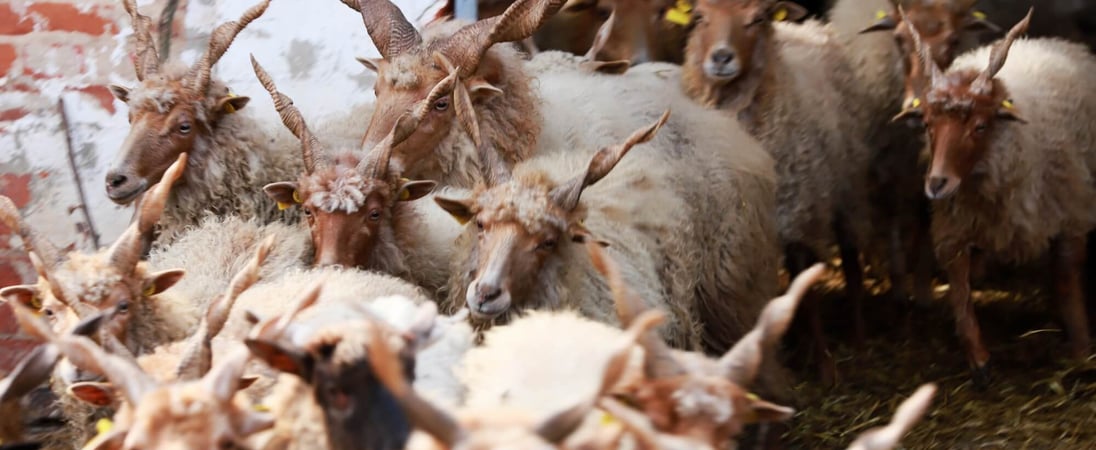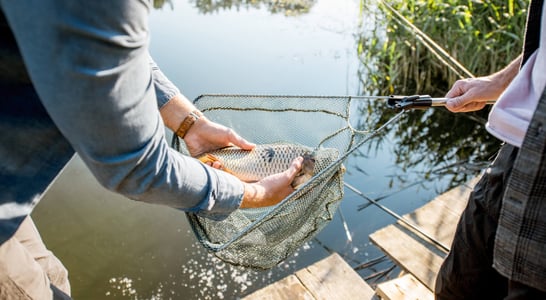
International Heritage Breeds Week
Support the survival of classic livestock breeds like Oberhasli goats, Wiltshire Wild Horn sheep, and Gloucester Old Spot pigs during Heritage Breeds Week.
Throughout history – ever since the domestication of the first animals – humanity has bred varieties of livestock and poultry. We love the animals that past generations handed down to us, but now there’s a risk that many of them could go extinct.
International Heritage Breeds Week is a grassroots attempt to push back against this loss and preserve more of our most cherished critters for posterity. Every year, the world loses many rare breeds to extinction.
Future generations will celebrate the fact that people acted to safeguard rare breeds like the Iron Age pig, Shetland Duck, and Northern Dairy Shorthorn cattle. But there’s no time to waste!
How to Celebrate International Heritage Breeds Week
If you love rare breed livestock and poultry, you’re not alone. These incredible creatures show off the diversity of farming and hark back to a simpler, purer time before the advent of industrial farming techniques. By supporting Heritage Breeds week, you can ensure the continuing survival of Gloucestershire Old Spot pigs, Wiltshire Wild Horn sheep, and beautiful Oberhasli goats.
There’s no shortage of things that you can do to celebrate the week. Check out a few of these:
Shop a Local Market
Your first port of call should be your local farmer’s market. Here you can purchase meat from rare breed animals, financially supporting those who still breed them. If you’re a farmer, you can turn the event into a spectacle, organizing music, tasty samples, and games for kids.
Invite the Community
Those who keep livestock can also open up their facilities to the public to introduce them to these majestic animals. Hosting a petting zoo can be a great way to get kids involved and encourage the next generation of conservationists.
A lot of farmers have taken to organizing shows and fairs too. People love heritage livestock and poultry but don’t usually get a chance to view them in person. Communities and farmers, therefore, can get together to organize events, raise money, and share information about these breeds. Live animals, entertainment, food stands, and exhibits are all great ways to attract the punters.
Show Support
You can also organize a fundraiser. Providing finance to those supporting rare breeds is essential. It helps to support a healthy agricultural system and prevents industrial farmers from squeezing rare breeds out of the market.
Get the Kids Involved
If you work with a school, you could lobby for the introduction of rare breed food products over the week. Children could sample eggs, milk, cheese, and meat from breeds of animals that wouldn’t ordinarily find their way onto their plates.
Raise Awareness
Get involved with outreach efforts on social media. Millions of people out there don’t know about the critical importance of heritage breeds or what they can do to support them. While there is a lot of information about the number of species going extinct in the wild, there’s less about breeds on the farm. It is, however, something that we all need to prevent to keep the agricultural sector strong.
So, what are you waiting for? Show our four-legged friends some love!
Learn About International Heritage Breeds Week
International Heritage Breeds Week is an event organized by The Livestock Conservancy, a conservation group dedicated to ensuring rare breeds survive. Go back a few decades, and it would have been hard for anyone to imagine that some breeds would be on the brink of extinction. But modern farming practices have led to a narrowing of diversity.
Only livestock and cattle that produce optimal yields under industrial meat production conditions are thriving. Boutique breeds don’t attract the same level of industry attention. And so the task of keeping them going falls to individual farmers and enthusiasts. Many of them don’t have the resources that they need.
Currently, The Livestock Conservancy estimates that the world loses around one rare breed per month. It counts a rare breed as any form of livestock or poultry in everyday use before the industrialization of the farming system.
Many of these species, the organization points out, were bred and developed over hundreds of years so that they could adapt to specific environments. Lowland cattle, for instance, often had vastly different characteristics to those grazed in the mountains, which was a more sustainable way to rear animals. Communities would select features that made animals more fertile, better at forging in local environments, and resistant to local parasites and disease.
History of International Heritage Breeds Week
While rare breeds have been a concern for conservationists for a long time now, the first International Heritage Breeds Week only took place in 2015. The purpose of the event was to celebrate the diversity of livestock and poultry and raise awareness of the need to protect rare breeds.
The Livestock Conservancy brought together organizations from across the industry. Hundreds of people from various groups, including farmers, the public and enthusiasts assembled to spread the word about the dangers facing rare breeds. Over time, they crafted a compelling campaign that reached millions of people, telling them about the plight of these animals and the need to find ways to protect them.
The week eventually culminated in Heritage Breeds Day. Farmers and ranchers used this as an opportunity to provide farm tours, workshops and give lectures to people in their communities.
The week proved so successful that The Livestock Conservancy decided to take the event overseas. Soon organizations from around the world were getting involved with proceedings, recognizing the value of protecting rare breeds.
Support began flooding in from the Rare Breeds Survival Trust, Asocriollanos, Save Foundation, the Smithsonian and SVF Biodiversity Preservation Project, Heritage Livestock Club, Rare Breed Conservation Society and many more. By 2018, there were more than fifteen livestock organizations involved. Together, they began giving consumers and the general public much-needed advice on what they could do to support rare breeds.
They also began making the case that preserving heritage breeds was about more than just indulging a passion. It was also important for biodiversity. Modern agriculture is something of a “race to the bottom.” Preserving diversity in livestock helps to arrest that process.
Also on ...
View all holidaysNational No Dirty Dishes Day
Give yourself a break from the drudgery of dishes for one day, by eating only food that don’t create dirty dishes. Order in, and use disposable containers and cutlery.
National Devil’s Food Cake Day
Indulge in the devilishly delicious experience of a rich, chocolaty Devil's Food Cake. With its velvety texture and heavenly aroma, one bite will send you straight to dessert heaven!
National Rescue Dog Day
Wag your tail for rescue dogs! These lovable pups bring joy, loyalty, and unconditional love to every home they enter. Adopt a furry friend and experience the happiness that only a rescue dog can bring.
National Talk Like Yoda Day
Feel the force flow through you as you speak like Yoda! With his unique, backwards-grammar style, this legendary Jedi master is the epitome of quirky cool. So channel your inner Yoda and let the wisdom of the force guide your words.








